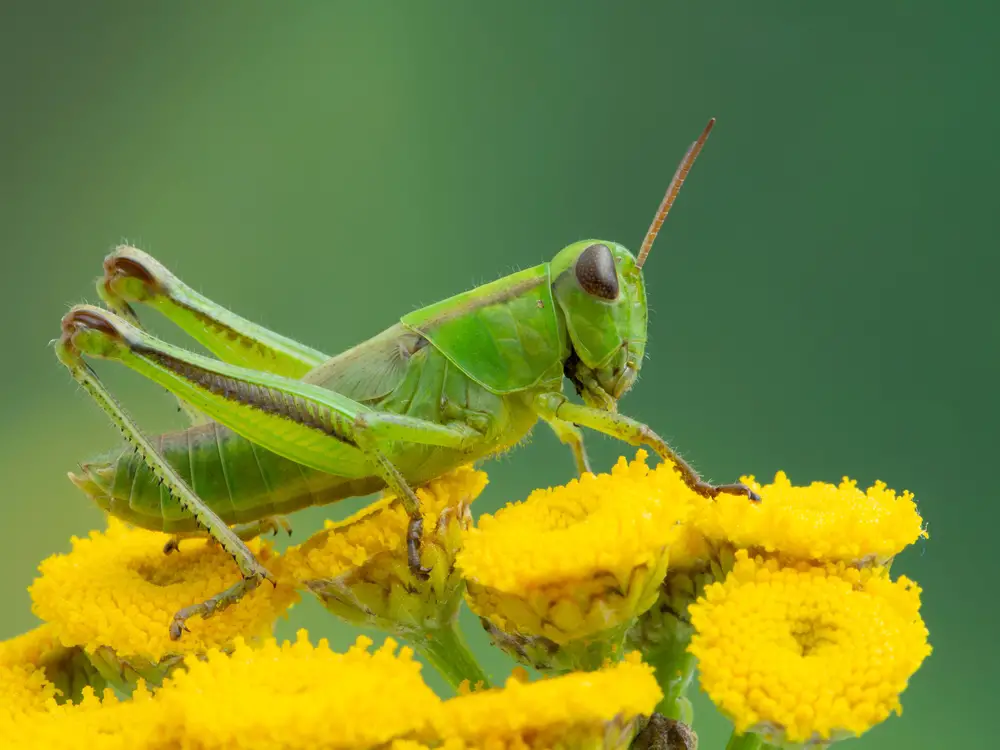Ever wondered: “What do grasshoppers eat?” You might think they do a lot of agricultural damage but there is a lot more to be discovered about these misunderstood little insects and they have some pretty cool traits.
One is the fact that their eardrums are located on their abdomen. They use their ears for many reasons, though they can’t hear very well!
When I think of grasshoppers, what first comes to mind is the weird insects that constantly jump into my face as I walk through meadows! But read on to discover more interesting facts about grasshoppers, what they eat, their habitat and life cycle, and all about their lookalikes.
Overview Of Grasshoppers
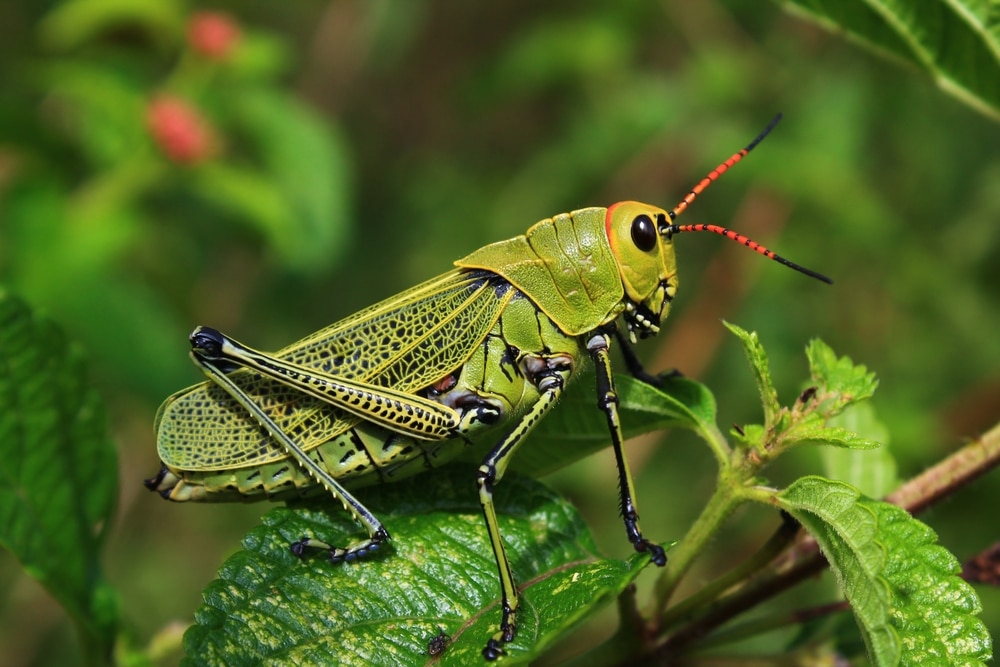
Characteristics Of Grasshoppers
Grasshoppers are insects within the Orthoptera family. This family includes grasshoppers, locusts, crickets, and katydids. They have unique characteristics that make them distinguishable! These features include a cylindrical body, long antennae, and powerful hind legs. They are often compared to crickets and locusts, though they have unique physical traits.
Some of these physical traits include:
Chewing Mouthparts
Different species have different styles of mandibles. This helps us determine what each species eats! More on that below.
Wings
Grasshoppers have wings that fold lengthwise on their body. These wings give them the ability to fly! They can jump far distances with their powerful hind legs, which propel them into flight.
Large Powerful Legs
Grasshoppers have big legs that help them hop. Their powerful legs also help them make sound. They do this by rubbing their forelegs with their hind legs. This method of music-making is called stridulation.
Eardrums
Eardrums are located on their abdomen and are used for a couple of reasons:
- Territory: As relatively territorial insects, they use their calls to mark their territory. They can also determine the sizes of other grasshoppers based on the sound of the chirp.
- Mating: They use their sound to attract and find mates. Males can locate females through these calls
- Alert calls: Certain chirps indicate to other grasshoppers that there are predators nearby
Grasshopper Diet
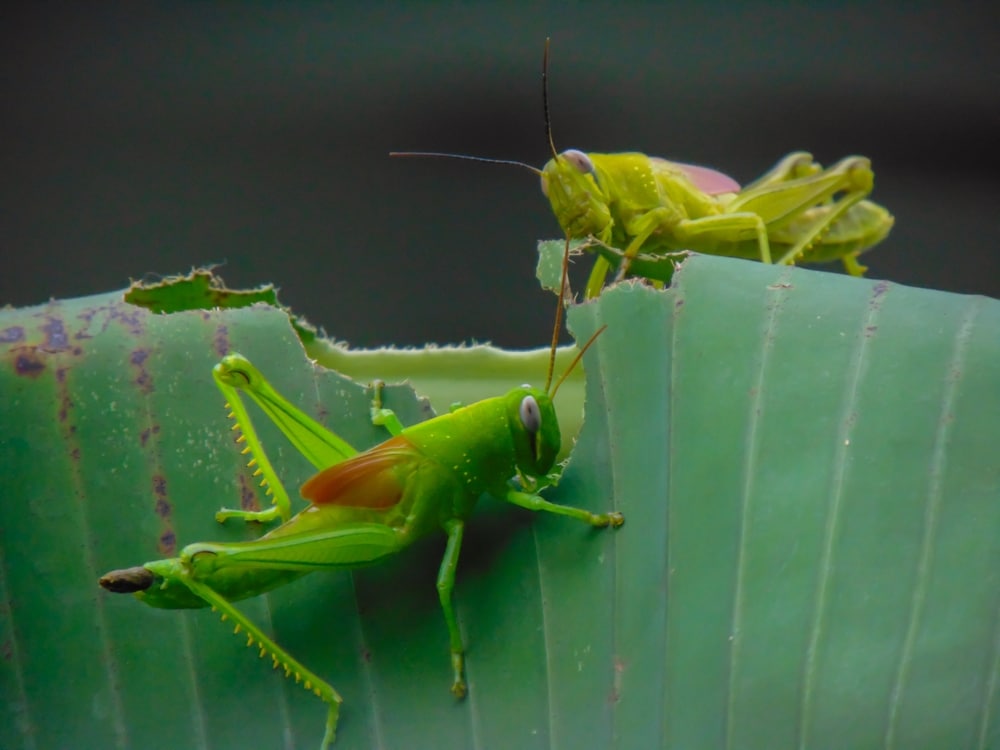
Most grasshopper species are considered herbivores, meaning their diet consists only of plant matter. However, some of species are omnivores and will also eat animal matter.
They can eat up to 16x their body weight in one day!
What Do Grasshoppers Eat?
Their mandibles provide insight into what grasshoppers eat. There are over 11,000 species and some have different mouth parts for eating different things. Some have molars like mandibles. This would suggest they eat a herbivore diet like grass. Some have razor-sharp ridges in their mandibles, which suggests another type of diet altogether. Some grasshopper species even eat meat!
Here is a list of the main diet of what they eat:
- Leaves
- Seeds
- Flowers
- Crops like:
- Barley
- Wheat
- Rye
- Alfalfa
- Corn
- Grass
They love the tender foliage of this plant matter.
They drink water. They get their water intake from dew, rain, and from the water content in the food they eat.
Impact Of Grasshoppers On Gardens
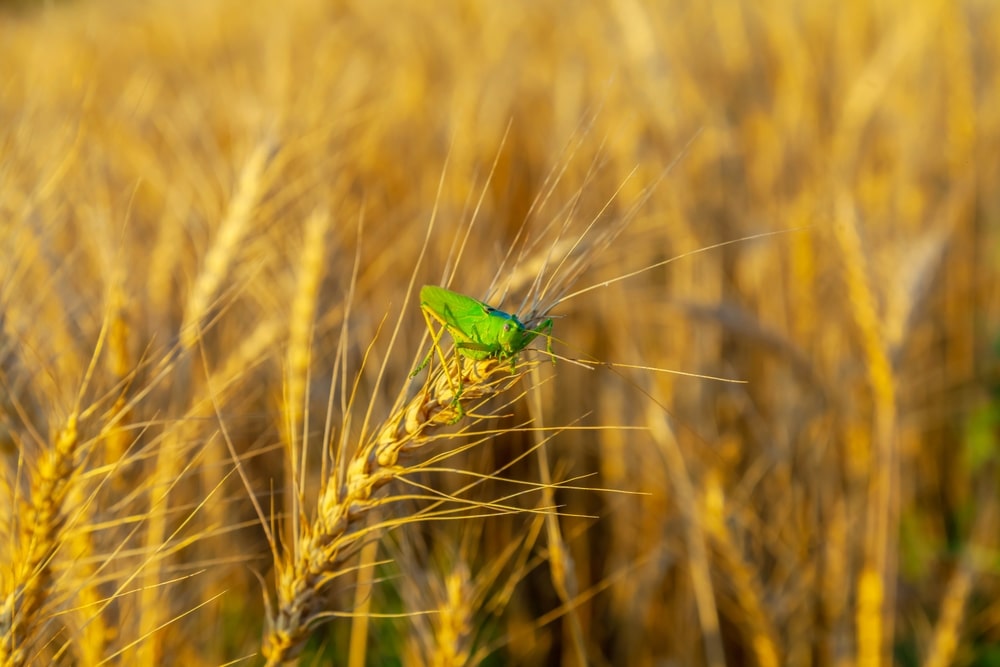
Positive Contributions To Garden Ecosystems
Grasshoppers are an important part of the food chain. These little insects are consider a prey species and are a food source for many animals in the garden and ecosystem. They contribute to the decomposition and regrowth of vegetation. They have nutrient-rich poop! This means their poop is a form of free fertilizer for the garden. They are prey for many loved bird species.
Potential Damage To Plants And Crops
They are considered major agricultural pests, as they love to munch down on a variety of plant matter. But not all species of grasshoppers can be damaging to your crops.
The red-legged grasshopper is a species that is damaging to gardens and crops in North America. This species is detrimental to your garden if you have large populations. In the US, grasshoppers cause about $1.5 billion of damage to crops annually. So you can understand why some farmers do not like them!!
Natural Predators of Grasshoppers
Natural predators that benefit from having these critters in the garden include:
- Birds
- Insects
- Mammals
- Reptiles
- Amphibians
The role of these predators in the garden ecosystems includes seed dispersal and pollination of important plant and flower species.
Effective Management And Control
Organic methods that are effective in the management and control of grasshoppers include:
- Homemade garlic spray
- Sprinkle flour around your plants
- Biological mitigation: get ducks or chickens!
- Attract birds to your garden with flowers like sunflowers or cosmos
- Plant a trap crop. Plant an area with tall grass, this deters them from eating your veggies
- Use a garden row cover to help protect your veggies
Grasshopper Habitat & Distribution
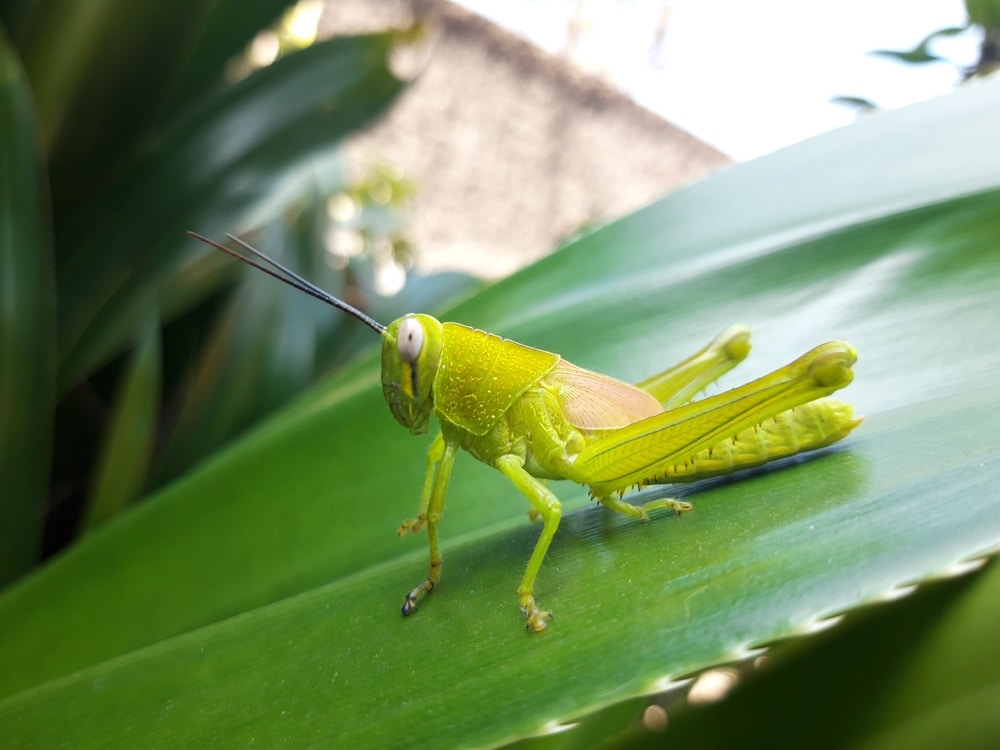
Where Do Grasshoppers Live?
Grasshopper distribution includes all continents except Antarctica. Grasshopper habitat varies greatly, but their preferred habitats include:
- Semi-arid habitats
- Lowlands
- Tropical forests
- Grasslands
- Farmlands
- Gardens
Seasonal Behavior And Life Cycle
Grasshoppers undergo an incomplete metamorphosis. This means they have three life stages Egg, Nymph, Adult within their 12-month life cycle.
Egg
Females lay their eggs under the soil or leaf litter. She coats the eggs in a sticky substance that creates egg pods of 10-300 eggs. Eggs remain under substrate for 10 months as eggs. Eggs hatch into nymphs during spring or summer.
Nymph
Nymphs are similar in appearance to adults but haven’t developed wings or reproductive organs. They are also smaller. This is the stage where they eat the most food and when they are considered “pests.” In this period, they will consume lots of plant matter!
Over the 6 weeks as a nymph, they undergo 5 to 6 molting phases to become adults. Molting means they will shed their skin and form new growth.
Adult
Reproductive organs are developed after 15 days. This is when they reach sexual maturity and begin the cycle anew. After about 30 days of developing into an adult they develop wings.
Difference Between Grasshoppers, Crickets, And Locusts
At first glance, these insects look similar, but when taking a closer look you can determine some major differences between crickets, locusts and grasshoppers! Crickets, locusts, and grasshoppers are both in the family Orthoptera. Grasshoppers and locusts belong to the suborder Caelifera, while crickets belong to the suborder Ensifera.
Here are some key characteristics that distinguish grasshoppers from their other look-alike insects.
Crickets:
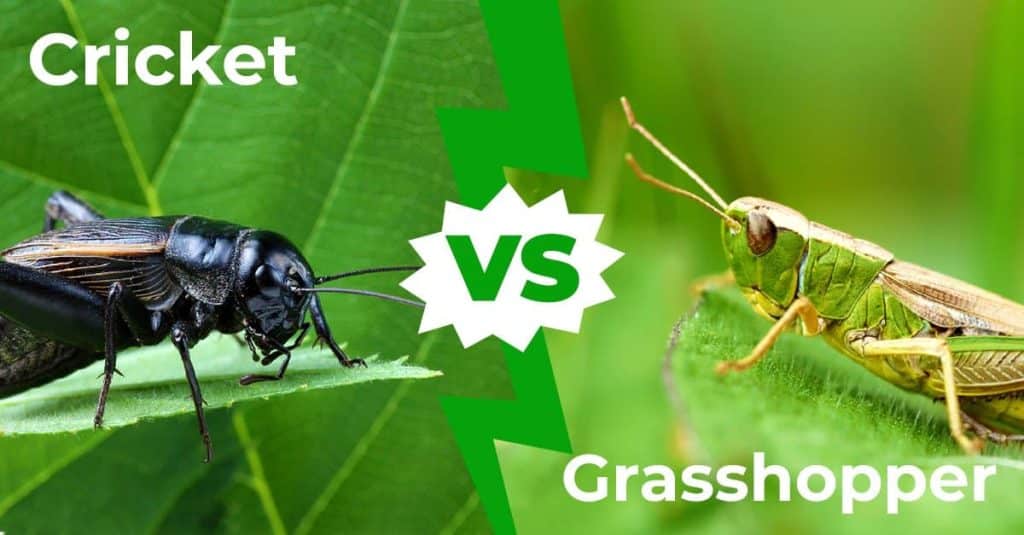
- Crickets are considered crepuscular creatures. This means they are most active at dawn and dusk
- Crickets have an omnivore diet. This means they eat both plant material and animal matter
- Crickets have long antennae
- Crickets chirp by rubbing their wings (not legs) together
- Crickets have ears on their forelegs
- Crickets can’t fly
Grasshoppers:
- Grasshoppers are diurnal. This means they are most active during the day
- Grasshoppers have short antennae
- They have a herbivore diet. This means they only eat plant matter (but some species are known to eat meat!)
- They make sound through the stridulation method (they use their legs)
- Grasshoppers have ears on their abdomen
Locust:
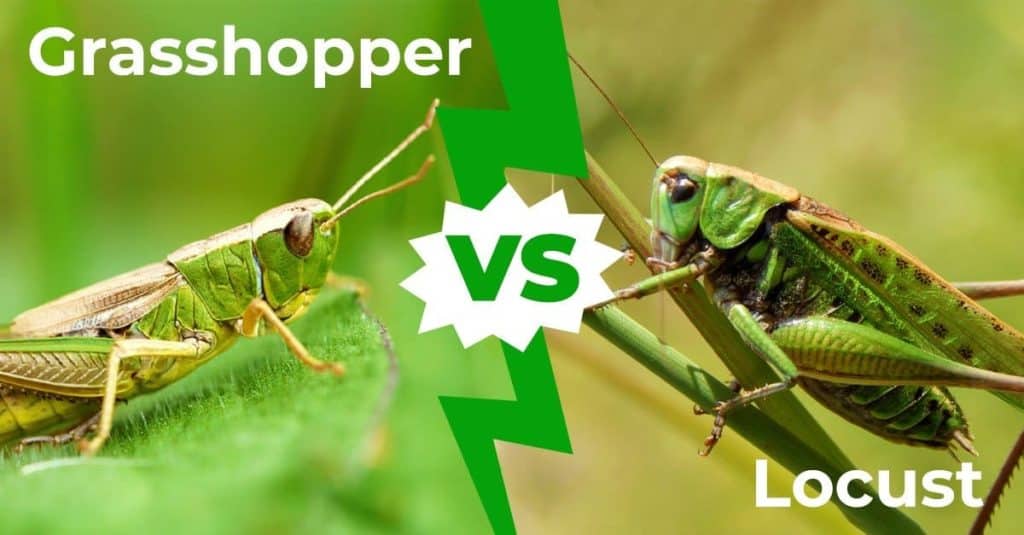
- Locusts have a similar appearance to grasshoppers, as they are in the same suborder
- They have longer and stronger wings, making them better flyers than grasshoppers
- They have smaller bodies than grasshoppers
- Locusts will swarm under favorable conditions, which is something grasshoppers do not do
Do Grasshoppers Bite?
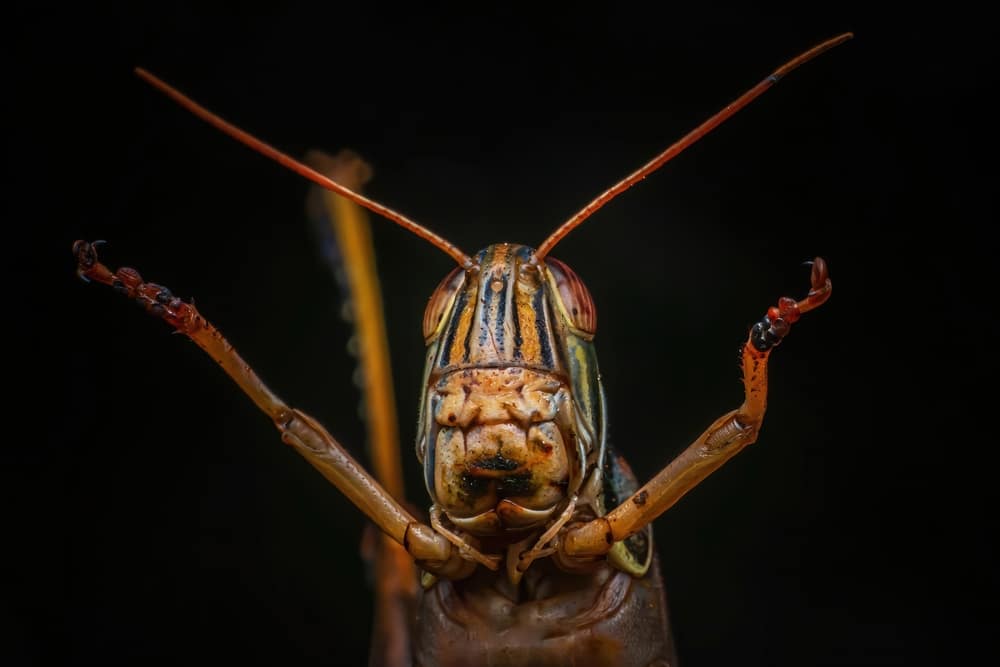
Health Risks And Reactions
Although generally not aggressive, they can bite, primarily in defense or stress. They are less dangerous compared to other biting insects like locusts or crickets. Bites can lead to minor irritation or allergic reactions but are not typically severe. Avoid contact by handling them carefully, or not at all!
If you do get bit by a grasshopper, clean and disinfect the bite. Monitor for any unusual symptoms if bitten.
Understanding Grasshopper Bites And Defense Mechanisms
If a grasshopper is stressed, as a defense mechanism, they may bite. They have mandible pinches that are generally not sharp that they use to take a nip. Another defense mechanism that a grasshopper uses is to vomit their stomach contents. This method releases a smell that can deter and repel predators.
How To Handle Grasshoppers Safely
It is best to avoid handling them altogether. Try enjoying them from afar. If there isn’t a need to pick them up, let them enjoy their short existence on this planet. If you do have to handle a grasshopper, please be respectful. Be gentle and calm. Do not pick them up by their legs, instead try cupping their entire body.
Handling a grasshopper roughly may cause stress and cause them to bite or employ other defense mechanisms.

